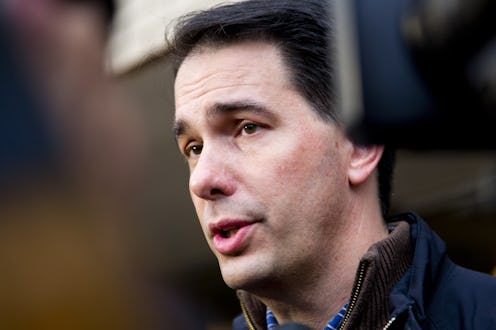News
Scott Walker's Right-To-Work Bill Hurts Workers
Collective bargaining sure is a difficult pill to swallow — at least in potential presidential candidate Gov. Scott Walker's mind. On Friday, the Associated Press reported that the Wisconsin governor, who previously took on public sector unions in bitter fight back in 2011, plans to sign into effect on Monday a recently passed state assembly bill that would effectively dismantle the rights of private-sector union workers. Touting freedom of choice for employees, on paper, the bill seems innocuous enough but would inevitably hurt the workers themselves in the long run.
According to the report, the bill's passage should have triggered alarm bells in many circles, but so far, it seems that union members have "resigned [themselves] to the inevitability" of their situation, which could take "decades" to undo. Explained one worker, 62-year-old bus driver Jerry Papa, to the AP, "You've got to fight back, but this kind of thing is going to be a generational process — it's going to take 25 to 40 years to correct problems Scott Walker's done in 4 1/2 years."
The bill itself bans private sector businesses from entering into any agreements with unions which would require dues of its employees, explained the Chicago Tribune in an article on Friday, and gives the impression of a generous alternative for workers to choose between collective bargaining fees and freedom from associated representation. Critics of the bill, however, paint a much starker and detailed picture.
Peter Barca, Assembly minority leader, told The New York Times on Friday that the bill was "desperately wrong" for the state of Wisconsin. "I can’t think of any policy that’s more antithetical to Wisconsin values, to our very heritage, to the Wisconsin way of doing business than this bill," he said.
"Today is the day we have solidified the regressive era in Wisconsin," lamented Democratic Rep. Terese Berceau, according to the report by the Chicago Tribune.
Union workers, protesting outside the Capitol in single-digit temperatures, argued against the perception that the right-to-work passage would draw businesses to the Midwestern state. Instead, they claimed, it would allow companies to lower salaries and wages and would most likely result in more dangerous working conditions. According to a report by the Wall Street Journal on Friday, Democratic legislators were also quick to blame state Republicans for what they believed was simply a stunt to prop up the governor's potential presidential bid.
Said Democratic Rep. Cory Mason in a statement, "It’s the workers in this state that are suffering through the politics of our governor’s ambitions." Added Democratic Rep. Andy Jorgensen, "This has nothing to do ... with choice. It has everything to do with busting."
Following the bill's 19-hour debate session, Republican legislators defended the bill on Friday morning, saying that it afforded extra liberties for employees and businesses alike and insisting that the notion of freedom was absolute. "We stand today for a simple, but very powerful concept, the concept for worker freedom," said Republican Rep. Dean Knudson in a statement.
Some were more hostile in their accusations and assertions, including Republican Speaker Robin Vos, who accused Democrats of suffering from "Walker derangement syndrome." Republican Rep. Jeremy Thiesfeldt offered up a blistering critique of his opponents as well, insisting in a statement that use of the term "freedom" when referencing the bill was nothing but the truth. "I'm not going to apologize about using the word freedom, I'm going to use it over and over again because that's what this is about," he said.
A closer look at the bill, however, offers up more headache than clarity. According to the Chicago Tribune, the requirement of union dues by private sector businesses will become an incontrovertible crime, punishable by up to nine months in jail. Workers say that the bill will also throw a wrench into an already well-oiled system, which could in turn hurt the local economy.
Only time will tell whether the move was a direct effort by Walker and his associates to beef up his presidential candidacy resume or not. Whatever the case may be, downtrodden Wisconsin workers now have one more fight on their already beleaguered hands.
Images: Getty Images (2)
